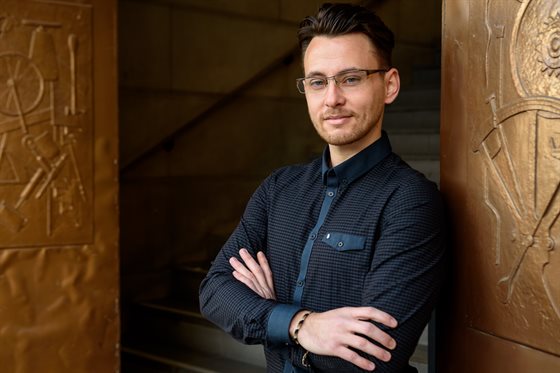A psychologist from De Montfort University Leicester (DMU) has had a joint paper published by one of the most prestigious publishing houses in the world of science.
Dr Antonios Christou, VC2020 Lecturer in Cognitive and Affective Neuroscience, is one of a group of academics whose work was accepted to appear in Nature’s journal’s Scientific Reports.

Since the 19th century, Nature journals have been the most prominent publication in the field of science, having showcased landmark papers on the discovery of the structure of DNA, pulsars, nuclear fission and plate tectonics.
And now DMU’s Dr Christou has seen a paper written by him, together with colleagues from the Universities of York and Birmingham, accepted by the famous publication.
The paper documents work Dr Christou and his colleagues carried out looking at memory capacity – the ability people have to retain information for short periods of time.
Working with volunteers, the team carried out a series of experiments involving tracking a target on the computer screen with hand movements.
During the experiments, the equipment was adjusted so that hand movements resulted in cursor movements rotated 30 degrees to the right – much the same effect as if a computer user turns their mouse about 30 degrees clockwise and tries to operate the cursor on-screen.
The team then studied how each volunteer adapted the way they operated the equipment to compensate for the adjustment, analysing each volunteer’s strategy for maintaining control.
Everyday life experience makes it evident that people vary considerably in their abilities to learn such new skills. The study tested the hypothesis that individual differences in working memory may explain some of this variation.
The results suggested a link between the volunteers’ memory capacity and their ability to adopt a strategic response to the changing circumstances.
Dr Christou said: “Our study, published in the prestigious Nature’s Journal Scientific Reports, is the first to show that our ability to retain information for short periods of time, known as Working Memory Capacity, may have a critical involvement in the adoption of an explicit strategy during skill learning’’.
“The benefit of high working memory capacity during visuomotor adaptation may prove significant for future research, as working memory training may be particularly beneficial for tasks where an explicit strategy is crucial”
Dr Christou collaborated with Dr Fiona McNab, of the University of York, and Dr Joseph Galea and Professor Chris Miall, of the University of Birmingham. Click here to read their report.
Posted on Tuesday 21 February 2017